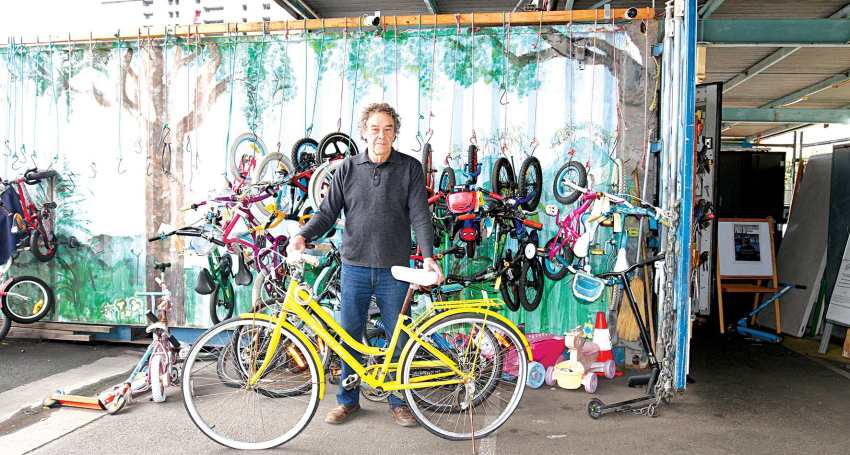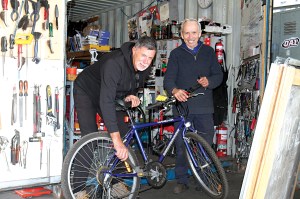Eviction looming for renowned bike recycling charity
News
A charity that has supplied thousands of recycled bikes to people in need over the past 15 years is in a race against time to find a new home before the bulldozers move in.

Bikes for Refugees operates from a 160sqm site adjacent the former Franklin St bus station in the CBD but its lease, which expires next month, will not be renewed with work scheduled to commence early next year on a State Government led $500 million, residential and commercial development. Neighbouring community hub, the Joinery, will also be demolished.
Renewal SA has announced it will reshape the site “into an iconic inner-city destination” called Tapangka with 392 new homes (about one-third to be classed as affordable) and commercial, civic and retail spaces as part of a “carbon neutral precinct”.
Advertisement
Bikes for Refugees, which has been run entirely by volunteers since 2010, donated 787 free bikes to people in need in the last financial year alone, as well as handing out $55,000 to charities.
The City of Adelaide, which sold the site to Renewal SA in 2024 and remains the temporary landlord, confirmed there would be no further lifeline. A lease extension was granted by the council until September a few months ago.
“We are keen to see Bikes for Refugees find a new home,” a spokesperson said.
Renewal SA said that it recognised the valuable contribution the charity has made to the community since its inception and that finding a suitable new home can be complex.
“We commend their longstanding commitment to supporting vulnerable people and wish them well as they endeavour to continue this important work,” a Renewal SA spokesperson said.
But neither the charity, government nor council has yet been able to find a new home. Bike for Refugee’s fear is that by closing down even temporarily while new premises are sought, the not-for-profit outfit may lose impetus and never reopen. Many of its volunteers are aged
in their 60s and 70s.
Since it was launched by former microbiologist Dr Mike Brisco in 2010, Bikes for Refugees has accepted more than 17,000 broken and unwanted bicycles and, after expert work from its volunteers, has given them to people in hardship. It also donates proceeds from the sale of revamped bikes to charity.
Vinnies SA and the national branch of the Sisters of Mercy have benefited from Bikes for Refugee cash contributions while Catherine House in Adelaide received four bikes from the group in the 2023-24 financial year.
Last year, volunteers gave about 4000 free hours to Bikes for Refugees which aligns with several United Nations development goals including contributing to sustainable cities and communities, and climate action.
Retired teacher and Bikes for Refugees chair, Greg Dowling, showed The Southern Cross around the Franklin St site. There are currently about a dozen volunteers, with different skills, helping at the city site.
Dr Brisco was involved with leukemia research at Flinders University and on the committee at Bike Adelaide when he heard about two Congolese refugees needing transport about 20 years ago. He used his contacts to help find revamped bicycles for them. Seeing an ongoing need among refugees, he set up a repair shop in his back yard in Campbelltown before eventually landing in Franklin St in 2015.
Advertisement
“Mike has done a fantastic job, it’s quite an operation,” said Peter Henry, a Murray Bridge parishioner and farmer who volunteers at Bikes for Refugees.
“He is an unsung hero.”
The public has been generous, dropping off 1533 bikes last year alone. The adjoining car park allows easy access and has been invaluable.
Of these bikes, more than half were repaired, serviced and donated to people referred by charities. Many recipients are newly arrived refugees.
About 3500 people visited Bikes for Refugees in the 2023-24 financial year. Greg said Saturdays, when bikes are sold and handed out, were “chaotic”.

Volunteers Malcolm Vernon and Murray Bridge parishioner Peter Henry.
“We have four volunteers on a Saturday,” he said.
“The Australian Refugee Association decides who is suitable for a free bike. We have one volunteer who speaks Arabic and Persian. There’s a lot of sign language going on and there is always the phone (for translation).”
Invariably refugees have neither cars nor a driving licence and tend to live outside the CBD. Many recent recipients are from Afghanistan and Central and South America.
Greg said bikes provided not only exercise and a way to get around but a purpose in settling in, finding a job and getting to work.
“We have had many refugees come back to us and say it was crucial for them to access transportation,” he said.
“There have been some great success stories over the past 10 years.
“We have some people who have not had to rely on welfare and have got into home ownership and had families.”
Recycled bikes that aren’t given away are sold to the public at about one third of the market rate with proceeds going to 30 charities last financial year.
However, from September 30 the lease on the concrete stand with its tarpaulin canopy will cease, as will Bikes for Refugee unless it finds a new home. It needs somewhere accessible where people can hand over, collect and buy bikes.
Greg said if nothing turns up shortly, then everything the charity owns will be bundled into storage and despatched, in all probability, to Peter Henry’s farm near Tailem Bend.
“If we don’t get anything by the end of August, we will progressively start to shut down,” he said.
“I think we should leave the site clean. I don’t want us to be embarrassed about leaving.”











